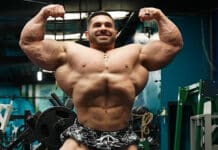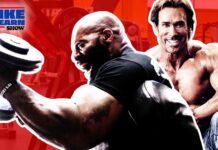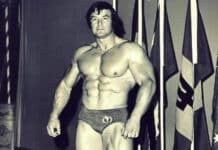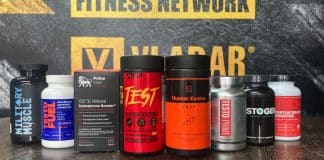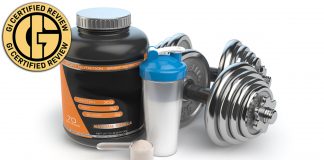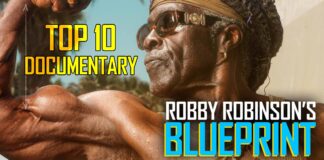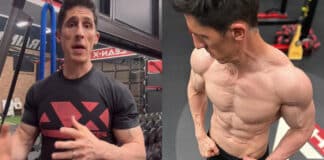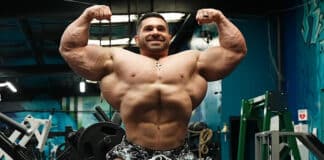George Farah discusses steroid regulations in sports and how he believes in allowing all athletes to use PEDs
The final episode of the engaging series, A Conversation With George Farah, brings the series to a powerful conclusion. In this episode, George Farah discusses a wide range of topics, from legislative changes affecting bodybuilding supplements to controversial opinions on performance-enhancing drugs (PEDs) in sports, as well as his views on Testosterone Replacement Therapy (TRT) and Hormone Replacement Therapy (HRT). Farah also shares insights about his upcoming book and documentary.
Our conversation with George Farah comes to a conclusion this week with a final batch of interesting topics including:
- New York State bans over-the-counter bodybuilding products for minors
- Potential heart risks of pre-workout supplements
- Legalizing PEDs for all sports
- Testosterone and Hormone Replacement Therapy – growth & stigmas
- A preview of George Farah’s book and documentary
All of this and more get covered in our recap of the final episode. Let’s dive in!
View this post on Instagram
Legislative Changes: Bodybuilding Supplements for Minors
New York State Ban
The episode opens with a discussion about New York State’s recent ban on over-the-counter bodybuilding products for minors. George Farah expresses confusion and skepticism about this legislation, contrasting it with the ongoing legality of other harmful products like cigarettes (though he notes that cigarettes are also banned for minors).
Farah questions the motivations behind such bans, suggesting that the United States prioritizes profit over the health of its citizens. He criticizes big food companies for deliberately adding addictive ingredients to their products, drawing a parallel to the regulation of bodybuilding supplements.
The Dangers of Pre-Workout Supplements
Potential Heart Risks
Vlad Yudin inquires about the potential dangers of pre-workout supplements, particularly their impact on heart health. Farah explains that the risks depend on individual usage and adherence to recommended dosages. He emphasizes that taking the recommended dose should not cause health issues, but warns that many young people misuse these products, believing that more is better. This misuse extends to both over-the-counter drugs and PEDs like steroids, leading to significant health risks.
Performance-Enhancing Drugs in Sports
PED Controversy in MMA and Boxing
The conversation shifts to a recent controversy in boxing, where a fighter tested positive for PEDs after winning a match. Farah provocatively suggests that all athletes should be allowed to use PEDs. He argues that legalizing steroids would remove the stigma and create a level playing field. According to Farah, making PEDs legal and regulated would reduce black market reliance, ensuring safer usage under medical supervision. He envisions a system where athletes receive prescriptions and regular check-ups to monitor their health and steroid use.
Testosterone and Hormone Replacement Therapy
The Role of TRT and HRT
Vlad Yudin asks for Farah’s views on TRT and HRT, questioning why these therapies are often prescribed by wellness clinics rather than mainstream doctors. Farah acknowledges that a growing number of doctors are beginning to prescribe TRT, but believes the practice is still hindered by outdated governmental policies that stigmatize all forms of steroids. He argues that TRT and HRT, when used properly, are beneficial for adults with low testosterone levels, improving their health and quality of life.
Farah criticizes the government, particularly under President Biden, for perpetuating the negative stereotype of steroids. He finds it hypocritical that while hormone treatments are allowed for gender transition, there is reluctance to provide TRT to men with low testosterone. Farah underscores that the government’s stance on health issues is often driven by money and power rather than genuine concern for public well-being.
George Farah’s Book and Documentary
Personal and Professional Reflections
Towards the end of the episode, Farah talks about his upcoming book and documentary. The documentary focuses on testimonials from other athletes and experts about Farah’s impact on the sport, with an impressive premiere in Pittsburgh that drew 6,000 attendees. Farah finds this recognition humbling and a testament to his influence in bodybuilding.
The book, however, is more personal, offering Farah’s perspective on his life and career. He aims to highlight the opportunities available in the United States and share his journey from adversity to success. Farah’s story is one of resilience and positivity, turning hardships into triumphs—from sleeping in his car to owning a large home. He hopes his book will inspire others to adopt a positive mindset and achieve their goals, underscoring his belief that the United States is a land of opportunity.
Wrap Up
Episode four of A Conversation With George Farah concludes the series on a high note, encapsulating the essence of Farah’s wisdom and experiences. His candid discussions on controversial topics, combined with personal reflections, offer a comprehensive look into the complexities of bodybuilding and health. Farah’s insights on legislative changes, PEDs, and TRT/HRT provide valuable perspectives for both enthusiasts and professionals in the sport.
As the series wraps up, viewers are left with a deeper understanding of the bodybuilding world and the influential figures within it. George Farah’s journey and philosophies serve as a powerful reminder of the importance of resilience, health, and a positive mindset in achieving success.
You can watch the full episode above. And make sure to stick around on the Generation Iron Fitness Network for all things bodybuilding, strength and fitness!




